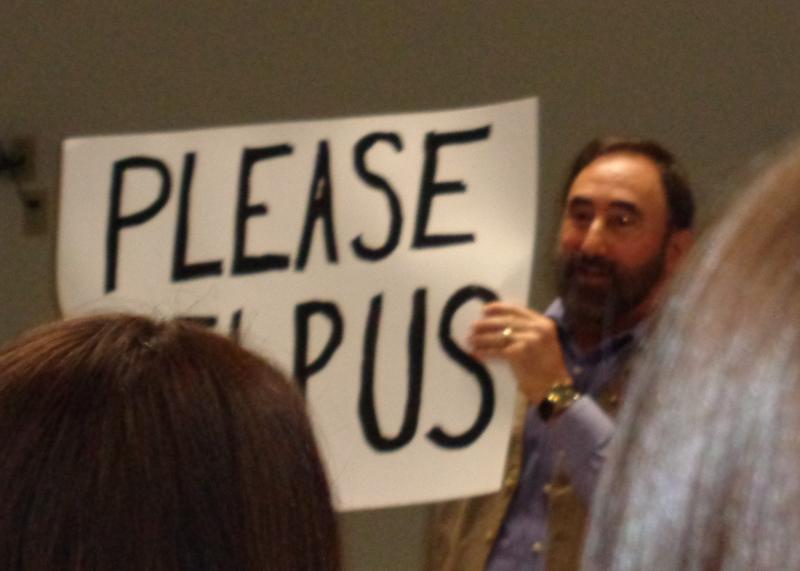About heroin in Knox County: A conversation citizens want to continue
 Family Practitioner Ira Mandel holds up a plea for area medical providers to accept patients with drug addictions. (Photo by Sarah Thompson)
Family Practitioner Ira Mandel holds up a plea for area medical providers to accept patients with drug addictions. (Photo by Sarah Thompson)
 Family Practitioner Ira Mandel holds up a plea for area medical providers to accept patients with drug addictions. (Photo by Sarah Thompson)
Family Practitioner Ira Mandel holds up a plea for area medical providers to accept patients with drug addictions. (Photo by Sarah Thompson)
ROCKLAND — Family medicine physician Ira Mandel treats a hundred addicts per month, more than 1,000 per year in Midcoast Maine; yet, the numbers of area residents he turns away remains high. Until recently, when Brian Pierce became licensed to subscribe Suboxone, Mandel was the only medical practitioner in the area with either the ability, the education, or the willingness to treat what some classify as a brain or chemical disease.
Mandel’s 100 patient-per-month cap is set by legislation in order to keep tabs on the Suboxone drug found to be necessary, at least initially, to a person’s recovery, according to Mandel.
“Less than 10 percent will succeed without medication,” Mandel said.
Area residents, along with a few people from Augusta and Bangor, packed into Rockland’s City Hall, Thursday, Feb. 4, hungry for the same answers that coordinators of the forum hoped to gain by holding the event. Those coordinators, under the umbrella Maine Opiate Collaborative Task Force, are on a tour of the state, seeking ideas to present to federal, state, and local initiatives.
The crowd, which overflowed to three-deep, standing-room-only space in the back represented hospital nurses, guidance counselors, former addicts, relatives of addicts, religious spiritual supporters, law enforcement, first responders, and members of the public.
Ideas flowed forth, but only after initial accusations were aired, primarily directed toward law enforcement, health insurance companies, court systems, uncaring medical providers, and media outlets not providing the information individual residents demand.
“What are you doing to keep addicts from reselling prescription drugs?” one woman asked of the panel, which included Maine DEA’s James Pease; Sgt. Don Finnegan, Maine Drug Recognition Expert, Rockland Police Department; Mandel, family practitioner; Kelsey Arsenault, Knox County Community Health Coalition, Substance Abuse Specialist, and a community member in recovery; Rockland Mayor Louise Maclellan-Ruf, who is a certified addiction specialist and sibling to a user; and Kristy, an addict in recovery who was there to represent the non-stereotypical user.
“I’m raising my grandchildren because my daughter’s in jail after her third attempt at rehab,” said another.
The conversation then began to settle down, as some in the audience made clear that addicts are members of the community.
Mandel listed the professions of those who’ve sought his help — business owners, store owners, secretaries, lobstermen, carpenters, painters, landscapers, waitresses, bartenders. computer programmers, several mental health professionals, hospital employees, car dealership owners, real estate agents, hotel workers, foresters, taxi drivers, and several law enforcement professionals.
The crowd as a whole agreed that prevention is key, especially after Arsenault, Knox County Community Health Coalition substance abuse prevention specialist, provided a statistic showing that every $1 investment in prevention yields an $18 savings in health, criminal and juvenile justice, education, and lost work productivity.
More than 10 percent of this community’s population have a drug problem, according to Mandel.
For a community already bombarded by taxes, cost-effective solutions are needed to deter a local drug epidemic from growing higher.
Diversion programs, Project Hope of Scarborough, immediate assistance to anyone stating a readiness for help, early-elementary school education programs, teen activities to prevent the boredom that leads to experimentation, longer in-patient treatments, treating the underlying emotional trigger, cleansing the body to rid the chemical stimulant, detox acupuncture and many more ideas were brought forth.
In the end, the crowd agreed that one type of treatment program did not fit all.
The Waldo County Heroin/Opiate Community Forum is scheduled for Wednesday, Feb. 10, 6 to 8 p.m., at the Troy Howard Middle School in Belfast.
Event Date
Address
United States



























